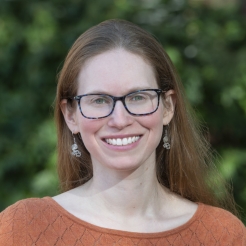Katie Boronow, MA

Katie Boronow joined Silent Spring Institute in 2015. She develops personal results reports for participants in exposure biomonitoring studies using DERBI, the Digital Exposure Report-Back Interface. Katie studies what people know about endocrine disrupting and cancer causing chemicals and how personal exposure reports can build environmental health literacy about these chemicals. She also researches how people’s behavior can influence their exposures to consumer product chemicals.
Katie holds a master’s degree from Harvard University in organismic and evolutionary biology and a bachelor’s from Yale University in biology. Her academic interests centered on the physiological and behavioral responses of lizards to environmental stressors, such as novel predators and climatic gradients, which she pursued through extensive fieldwork. Prior to graduate school, Katie worked at Eastern Research Group as an environmental scientist where she researched worker exposure to silica and diacetyl and assisted with community health investigations into potential exposure to toxic chemicals.
Projects
Publications & Presentations
Boronow, K.E., A. Maruzzo, R.A. Morello-Frosch, A.N. Patil, E. DeMicco, P. Brown, A.M. Padula, S.D. Geiger, and J.G. Brody. 2026. A personalized tutorial to improve understanding of individual chemical results and opportunities for reducing exposure. Journal of Exposure Science & Environmental Epidemiology. doi: 10.1038/s41370-026-00840-3
Boronow, K.E. and J.G. Brody. 2025. What do people need to know about endocrine disrupting chemicals and health? A mental models approach using focus groups of community-engaged research teams and a national survey. BMC Public Health. doi: 10.1186/s12889-025-25561-4
Franklin, E.T., K.E. Boronow, J.L. Ohayon, A. Momplaisir, J. Steele, C.K. Smith, L. Taylor, B.D. Brock, K.A. Grayson, K. Edgecombe, B.S. Harris, K.N. Pender, I.B. Kola, A.A.M. Llanos, D.K. Teteh-Brooks, L. Marcelin, J.G. Brody, R.E. Dodson. 2025. The Power of Strategic Social Media Influencer Communication to Improve Black Women’s Knowledge and Awareness of Environmental Endocrine Disrupting Chemicals: Surveys of Instagram Users. Journal of Medical Internet Research. doi: 10.2196/66128
Boronow, K.E., B. Cohn, L. Havas, M. Plumb, J.G. Brody. 2023. The Effect of Individual or Study-Wide Report-Back on Knowledge, Concern, and Exposure-Reducing Behaviors Related to Endocrine-Disrupting Chemicals. Environmental Health Perspectives. 131(9):097005. doi:10.1289/EHP12565.
Cordero, N.R.C., I.L. Previdi, H.R. Torres, I. Ayala, K.E. Boronow, A.S. Rivera, J.D. Meeker, A. Alshawabkeh, J.F. Cordero, J.G. Brody, P. Brown, C.M.V. Vega. 2023. Mi PROTECT: A personalized smartphone platform to report back results to participants of a maternal-child and environmental health research cohort program in Puerto Rico. PLOS Digital Health. 2(1): e0000172. doi: 10.1371/journal.pdig.0000172
Oksas, C., J.G. Brody, P. Brown, K.E. Boronow, E. DeMicco, A. Charlesworth, M. Juarez, S. Geiger, S.L. Schantz, T.J. Woodruff, R. Morello-Frosch. 2022. Perspectives of peripartum people on opportunities for personal and collective action to reduce exposure to everyday chemicals: Focus groups to inform exposure report-back. Environmental Research. 212(Pt A):113173. doi: 10.1016/j.envres.2022.113173.
Brody, J.G., P.M. Cirillo, K.E. Boronow, L. Havas, M. Plumb, H.P. Susmann, K.Z. Gajos, and B.A. Cohn. 2021. Outcomes from Returning Individual versus Only Study-Wide Biomonitoring Results in an Environmental Exposure Study Using the Digital Exposure Report-Back Interface (DERBI). Environmental Health Perspectives. 129(11):117005. doi: 10.1289/EHP9072
Dodson, R.E., K. E. Boronow, H. Susmann, J.O. Udesky, K.M. Rodgers, D. Weller, M. Woudneh, J.G. Brody, R.A. Rudel. 2020. Consumer behavior and exposure to parabens, bisphenols, triclosan, dichlorophenols, and benzophenone-3: Results from a crowdsourced biomonitoring study. International Journal of Hygiene and Environmental Health. 230:113624. doi: 10.1016/j.ijheh.2020.113624
Udesky, J.O., K.E. Boronow, P. Brown, L.J. Perovich, J.G. Brody. 2020. Perceived Risks, Benefits, and Interest in Participating in Environmental Health Studies That Share Personal Exposure Data: A U.S. Survey of Prospective Participants. Journal of Empirical Research on Human Research Ethics. 15(5):425-442. doi: 10.1177/1556264620903595
Boronow, K.E., L.J. Perovich, L. Sweeney, J.S. Yoo, R.A. Rudel, P. Brown, J.G. Brody. 2020. Privacy Risks of Sharing Data from Environmental Health Studies, Environmental Health Perspectives. 128(1):17008. doi: 10.1289/EHP4817
Boronow, K.E., J.G. Brody, L.A. Schaider, G.F. Peaslee, L. Havas, B.A. Cohn. 2019. Serum concentrations of PFASs and exposure-related behaviors in African American and non-Hispanic white women. Journal of Exposure Science & Environmental Epidemiology. 29, 206–217. doi: 10.1038/s41370-018-0109-y
Boronow, K.E., H.P. Susmann, K.Z. Gajos, R.A. Rudel, K.C. Arnold, P. Brown, R. Morello-Frosch, L. Havas, J.G. Brody. 2017. DERBI: A Digital Method to Help Researchers Offer “Right-to-Know” Personal Exposure Results. Environmental Health Perspectives, 125(2):A27-A33. doi:10.1289/EHP702.




